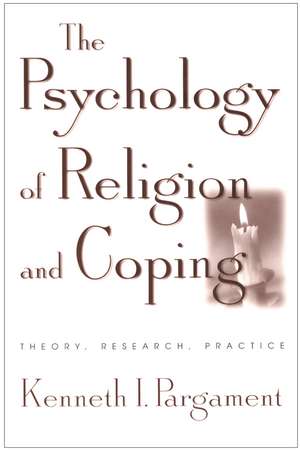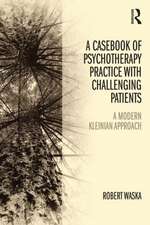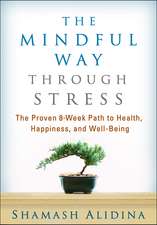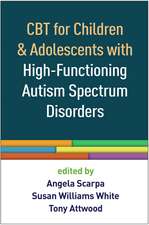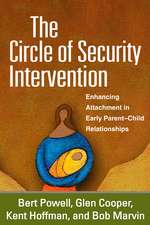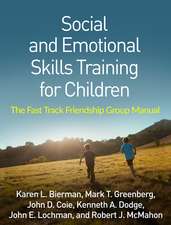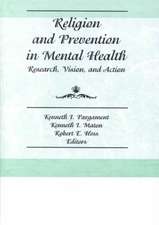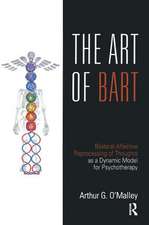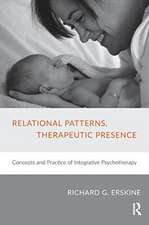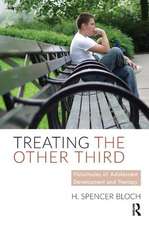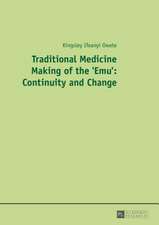The Psychology of Religion and Coping: Theory, Research, Practice
Autor Kenneth I. Pargamenten Limba Engleză Hardback – 29 iul 1997
When faced with a crisis, why do some people turn to religion to help them cope, while others turn away? Is religious belief merely a defense or a form of denial? Is religion a help or a hindrance in times of stress? Building a much-needed bridge between two different worlds of thought and practice religion and psychology this volume sensitively interweaves theory with first-hand accounts, clinical insight, and empirical research. The book underscores the need for greater sensitivity to religion and spirituality in the context of helping relationships, and suggests a range of ways that clinicians might work more effectively with religious issues in therapy.
| Toate formatele și edițiile | Preț | Express |
|---|---|---|
| Paperback (1) | 405.55 lei 6-8 săpt. | |
| Guilford Publications – 29 mar 2001 | 405.55 lei 6-8 săpt. | |
| Hardback (1) | 699.70 lei 6-8 săpt. | |
| Guilford Publications – 29 iul 1997 | 699.70 lei 6-8 săpt. |
Preț: 699.70 lei
Preț vechi: 768.90 lei
-9% Nou
Puncte Express: 1050
Preț estimativ în valută:
134.01€ • 138.06$ • 112.26£
134.01€ • 138.06$ • 112.26£
Carte tipărită la comandă
Livrare economică 24 februarie-10 martie
Preluare comenzi: 021 569.72.76
Specificații
ISBN-13: 9781572302143
ISBN-10: 1572302143
Pagini: 548
Dimensiuni: 152 x 229 x 37 mm
Greutate: 1.02 kg
Ediția:New.
Editura: Guilford Publications
Colecția Guilford Press
ISBN-10: 1572302143
Pagini: 548
Dimensiuni: 152 x 229 x 37 mm
Greutate: 1.02 kg
Ediția:New.
Editura: Guilford Publications
Colecția Guilford Press
Public țintă
Professional Practice & Development and UndergraduateCuprins
Contents
1. An Introduction to the Psychology of Religion and Coping
I. A Perspective on Religion
2. The Sacred and the Search for Significance
3. Religious Pathways and Religious Destinations
II. A Perspective on Coping
4. An Introduction to the Concept of Coping
5. The Flow of Coping
III. The Religion and Coping Connection
6. When People Turn to Religion: When They Turn Away
7. The Many Faces of Religion in Coping
8. Religion and the Mechanisms of Coping: The Conservation of Significance
9. Religion and the Mechanisms of Coping: The Transformation of Significance
IV. Evaluative and Practical Implications
10. Does It Work? Religion and the Outcomes of Coping
11. When Religion Fails: Problems of Integration in the Process of Coping
12. Putting Religion into Practice
1. An Introduction to the Psychology of Religion and Coping
I. A Perspective on Religion
2. The Sacred and the Search for Significance
3. Religious Pathways and Religious Destinations
II. A Perspective on Coping
4. An Introduction to the Concept of Coping
5. The Flow of Coping
III. The Religion and Coping Connection
6. When People Turn to Religion: When They Turn Away
7. The Many Faces of Religion in Coping
8. Religion and the Mechanisms of Coping: The Conservation of Significance
9. Religion and the Mechanisms of Coping: The Transformation of Significance
IV. Evaluative and Practical Implications
10. Does It Work? Religion and the Outcomes of Coping
11. When Religion Fails: Problems of Integration in the Process of Coping
12. Putting Religion into Practice
Notă biografică
Kenneth I. Pargament, PhD, is Professor of Psychology and Director of the PhD Clinical Psychology Program at Bowling Green State University. Currently President of Division 36 (Psychology of Religion) of the American Psychological Association, he is a recipient of the William James Award for his research on religion, stress, and coping. Dr. Pargament is a practicing clinical psychologist who has worked with clergy and congregation members from diverse religious communities.
Recenzii
The definitive work on religion and coping. Encyclopedic in its breadth and depth, the book provides a clinically relevant discussion of religion as a resource for mental health and an analysis of the processes that encourage the conservation and transformation of significance. Dr. Pargament describes the psychology of coping from the complementary vantages of a scholar and clinician. Of note is the sophisticated presentation of theory and empirical data which leads to an appreciation of the role of religion in sustaining meaning and hope in the face of adversity. For the religion scholar, this book provides scientific support for long held assumptions about an important function of faith. For clinicians, this work opens the door for further inquiry into the nature of psychological treatment concerning the provision of hope and articulation of personal meaning. Rarely does one find a book so equally comprehensive and accessible. Academicians and mental health professionals alike will find this volume a thought-provoking contribution to the field. --Edward P. Shafranske, Ph.D., Professor of Psychology, Graduate School of Education and Psychology, Pepperdine University and Faculty, Southern California Psychoanalytic Institute; Past President and Fellow of APA Division 36: Psychology of Religion and William Bier Award recipient.
In this fascinating book, Kenneth Pargament links religion and coping using an elegant and articulate conceptual framework. He makes religious coping accessible to the theoretician, the researcher, and the practitioner, and he provides many insights about the multiple functions of religious coping, when it is used, by whom, toward what ends, and with what consequences. The Psychology of Religion and Coping: Theory, Research, and Practice is a book that the field of coping has needed for a very long time. --Susan Folkman, Ph.D. Professor of Medicine, University of California, San Francisco
Kenneth Pargament has achieved what is all too rare in the psychology of religion: a systematic program of empirical research, guided by theory, that is of practical relevance to helping professionals. No longer is there any excuse for failing to appreciate the subtle and complex ways in which religion and coping interface in the areas of theory, research or practice. This is the authoritative text defining the state of the art in the area of religion and coping. --Ralph W. Hood Jr., Ph.D., Professor of Psychology, University of Tennessee at Chattanooga; Editor of the Journal for the Scientific Study of Religion; Past President of Division 36 of the APA
We who are clergy know what we do in our ministry and we know its effectiveness. But why is ministry effective?...Here is a way to find out. This work contains a massive amount of information. It presents a coherent way of thinking about ministry--and, in fact, how to improve it. --Larry VandeCreek, D.Min.
The Psychology of Religion and Coping will provide students with a solid foundation and understanding of religion in the coping process. It is a superbly done work that should be required reading for every student in psychology, the ministry, and related professions. It fills a deep gap in the psychological literature, which for years has neglected perhaps the most important and common way that people cope with stress. --Harold G. Koenig, MD, MHSc
...a terrific book, especially for anyone who lives as closely to their own and other' search for meaning in stressful life experiences as chaplains do....I found it remarkably readable and thought-provoking throughout....One of the many strong points of the book for us is the author's liberal use of incisive and moving stories....it belongs in the hands of every professional chaplain. --Chaplain Margot Hover, Horizons, Newsletter of the National Association of Catholic Chaplains
This is one of the most comprehensive texts in the field. Second to none. --Marcus G. Smucker, Eastern Mennonitie Seminary University
-In this fascinating book, Kenneth Pargament links religion and coping using an elegant and articulate conceptual framework. He makes religious coping accessible to the theoretician, the researcher, and the practitioner, and he provides many insights about the multiple functions of religious coping, when it is used, by whom, toward what ends, and with what consequences. The Psychology of Religion and Coping: Theory, Research, and Practice is a book that the field of coping has needed for a very long time. --Susan Folkman, Ph.D. Professor of Medicine, University of California, San Francisco
Kenneth Pargament has achieved what is all too rare in the psychology of religion: a systematic program of empirical research, guided by theory, that is of practical relevance to helping professionals. No longer is there any excuse for failing to appreciate the subtle and complex ways in which religion and coping interface in the areas of theory, research or practice. This is the authoritative text defining the state of the art in the area of religion and coping. --Ralph W. Hood Jr., Ph.D., Professor of Psychology, University of Tennessee at Chattanooga; Editor of the Journal for the Scientific Study of Religion; Past President of Division 36 of the APA
We who are clergy know what we do in our ministry and we know its effectiveness. But why is ministry effective?...Here is a way to find out. This work contains a massive amount of information. It presents a coherent way of thinking about ministry--and, in fact, how to improve it. --Larry VandeCreek, D.Min.
The Psychology of Religion and Coping will provide students with a solid foundation and understanding of religion in the coping process. It is a superbly done work that should be required reading for every student in psychology, the ministry, and related professions. It fills a deep gap in the psychological literature, which for years has neglected perhaps the most important and common way that people cope with stress. --Harold G. Koenig, MD, MHSc
...a terrific book, especially for anyone who lives as closely to their own and other' search for meaning in stressful life experiences as chaplains do....I found it remarkably readable and thought-provoking throughout....One of the many strong points of the book for us is the author's liberal use of incisive and moving stories....it belongs in the hands of every professional chaplain. --Chaplain Margot Hover, Horizons, Newsletter of the National Association of Catholic Chaplains
This is one of the most comprehensive texts in the field. Second to none. --Marcus G. Smucker, Eastern Mennonitie Seminary University
This volume may be the best book on the psychology of religion in a generation or more. Well written and clearly outlined, it is grounded on an immense foundation of empirical data.
--Bulletin of the Menninger Clinic, 2/17/2001ƒƒThis thoroughly researched and well-written work should be on the reading list of every psychotherapist and counselor....Pargament is able in his concluding chapters to present very grounded and useful advice for how religious beliefs and experience could be better utilized in counseling situations, not only as immediate coping devices for current problems, but also as spurs to further psychological and emotional growth.
--Journal of Religion and Health, 2/17/2001ƒƒA terrific book, especially for anyone who lives as closely to their own and others' search for meaning in stressful life experiences as chaplains do....Belongs in the hands of every professional chaplain.
--Horizons: Newsletter of the National Association of Catholic Chaplains, 2/17/2001ƒƒA massive, scholarly, even-handed, level-headed book....It sets a new standard of excellence for works on religion and psychology.
--American Journal of Psychiatry, 2/17/2001Descriere
When faced with a crisis, why do some people turn to religion to help them cope, while others turn away? Is religious belief merely a defense or a form of denial? Is spirituality a help or a hindrance in times of stress? Building a much-needed bridge between two different worlds of thought and practice--religion and psychology--this volume sensitively interweaves theory with first-hand accounts, clinical insight, and scientific research. The book underscores the need for greater sensitivity to religion and spirituality in the context of helping relationships, and suggests a range of ways that faith might be used more fully to help people in crisis.
